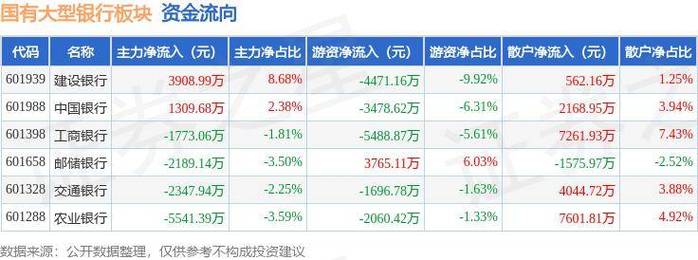农业银行股票的趋势分析
To analyze the situation where large stateowned banks experience intraday declines, particularly focusing on Agricultural Bank of China's specific drop, we need to consider several factors that influence the banking industry and stock market movements.
Understanding Intraday Stock Movement in StateOwned Banks
Stateowned banks, such as the Agricultural Bank of China (ABC), are pivotal entities in the financial sector, often reflecting broader economic trends and market sentiments. Intraday fluctuations, especially significant drops, can stem from various interconnected factors:
1. Market Sentiment and Economic Indicators
Economic Data Releases:
News related to economic health, inflation rates, GDP growth, and employment figures can impact market sentiment and investor confidence in banking stocks.
Government Policies:
Changes in fiscal policies, interest rates, or regulatory measures affecting the banking sector can prompt market reactions. 2. SectorSpecific Factors
Banking Regulations:
Stricter regulations or changes in capital requirements can influence how investors perceive the profitability and stability of stateowned banks.
Competitive Environment:
Increased competition from fintech companies or other financial institutions can pressure traditional banks' market positions. 3. CompanySpecific Considerations
Financial Performance:
Quarterly earnings reports, revenue forecasts, and loan quality metrics directly impact stock valuation and investor sentiment.
Management Changes or Strategic Decisions:
Leadership shifts, mergers, acquisitions, or significant business strategy alterations can affect stock prices.Agricultural Bank of China (ABC) Case Study
Factors Contributing to Intraday Drop
1.
Market Volatility:
Fluctuations in broader stock indices (e.g., SSE Composite Index) can lead to amplified volatility in individual stocks like ABC.2.
SectorSpecific Challenges:
Interest Rate Environment:
Changes in benchmark interest rates or monetary policy adjustments can impact lending margins and profitability.
NonPerforming Loans (NPLs):
Concerns over asset quality, especially an increase in NPLs, can undermine investor confidence.3.
MacroEconomic Factors:
Growth Concerns:
Economic slowdown indicators or forecasts may lead investors to reassess growth prospects for banks heavily reliant on economic expansion.
Global Market Conditions:
Geopolitical tensions, international economic developments, or global market corrections can spill over into domestic stock markets.Investor Reaction and Market Dynamics
Technical Factors:
Intraday trading patterns, volume spikes, and technical indicators (e.g., moving averages, trading volumes) influence shortterm price movements.
Psychological Impact:
Market sentiment plays a crucial role; fear, uncertainty, and doubt (FUD) can exacerbate selloffs, especially in turbulent market conditions.Strategic Considerations and Risk Management
1. Diversification and Asset Allocation
Portfolio Rebalancing:
Investors should periodically rebalance their portfolios to manage risk exposure across different sectors and asset classes. 2. LongTerm Investment Perspective
Fundamental Analysis:
Assessing a bank's financial health, management quality, growth prospects, and competitive positioning can guide longterm investment decisions. 3. Risk Mitigation Strategies
StopLoss Orders:
Setting predefined exit points can limit losses during sudden price declines.
Hedging Instruments:
Options, futures, or inverse ETFs can provide downside protection in volatile markets.Conclusion
Intraday declines in stateowned banks like Agricultural Bank of China reflect a complex interplay of market sentiment, economic fundamentals, and companyspecific dynamics. Investors should remain vigilant, conduct thorough research, and consider consulting financial advisors to navigate market volatility effectively. By understanding these factors and employing prudent risk management strategies, investors can better position themselves to capitalize on opportunities while managing downside risks in the everchanging financial landscape.
This analysis outlines the multifaceted reasons behind intraday drops in stateowned banks, with a focus on Agricultural Bank of China, offering insights for investors navigating market volatility.




1 留言